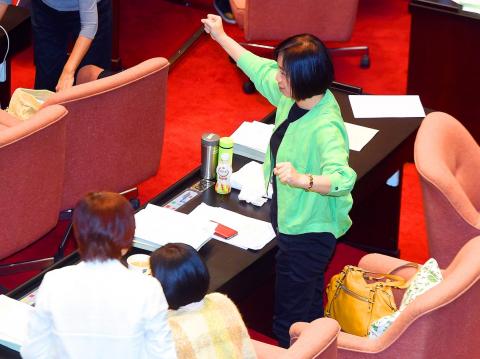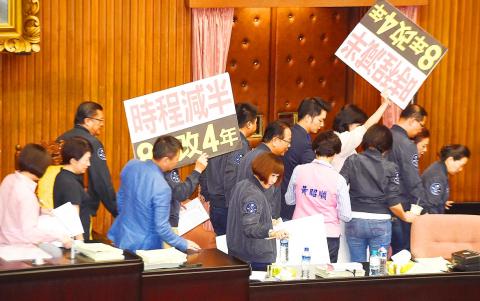The special act on the Forward-looking Infrastructure Development Program yesterday cleared a third reading at the legislature, with lawmakers passing a Democratic Progressive Party (DPP) motion to adjust the program’s budget from NT$882.49 billion (US$28.93 billion) over eight years to NT$420 billion over four years.
The legislature met in plenary session to review the bill after the DPP caucus on Tuesday made a concession to adjust the program’s budget and time frame during cross-caucus negotiations, ending the Chinese Nationalist Party’s (KMT) occupation of the legislative speaker’s podium that began on Monday morning.
The DPP, KMT and People First Party (PFP) caucuses on the same day signed on a DPP motion to divide the program into two stages of four years each, with a NT$420 billion special budget for stage one.

Photo: Liao Chen-huei, Taipei Times
Budget requests for the second stage are to be delivered to the legislature for review with the proviso that its size and time frame does not exceed the first budget.
The motion added three projects — establishing friendly nursing rooms in response to low birth rates; measures to ensure food safety; and nurturing talent and boosting employment — to the five projects outlined by the Executive Yuan: Rail construction, digital infrastructure, “green” energy, urban-rural development and aquatic infrastructure.
The National Development Council is to oversee the program, while Cabinet-level agencies are to be responsible for planning budgets for projects outlined in the program and local governments entrusted with a project should plan budgets accordingly, the motion said.

Photo: Liao Chen-huei, Taipei Times
Central government agencies must conduct environmental impact assessments, and viability and cost-effectiveness plans, and submit the reports to the Executive Yuan for approval before a budget is allocated.
The debt ceiling for the overall spending of the entire program is set at 15 percent of the government’s annual expenditure, in accordance with the Public Debt Act (公共債務法).
Should a specific project run under budget, the excess funds should be returned to the central government, the motion said.
A draft article — proposed in response to New Power Party (NPP) and KMT demands — which says the Control Yuan and concerned agencies should punish officials found to be involved in illegal activity that causes a project to fall behind the 80 percent completed mark was also passed yesterday.
Land expropriation carried out for a project must be done according to due procedure on the condition that it is necessary and it serves the public interest.
The council should regularly update the progress of the projects on the Executive Yuan’s Web site.
Citing the low utilization rate of the Kaohsiung Mass Rapid Transit (MRT) system, KMT legislators criticized the government’s plan to dole out large sums — previously about NT$420 billion — to construct railway systems, prompting a war of words with the DPP caucus.
“The MRT might be taken for granted by Taipei residents, but for people living in the south of the nation it has remained a luxury,” DPP Legislator Rosalia Wu (吳思瑤) said, adding that a MRT system should not be a privilege of Taipei residents.
“The final version of the bill was rendered in response to overwhelming public pressure and strong criticism,” KMT Legislator Lee Yen-hsiu (李彥秀) said.
With budget proposals set to be reviewed by the legislature next week, the DPP had better be prudent over its budget allocation to avoid triggering a backlash, she said.

SEPARATE: The MAC rebutted Beijing’s claim that Taiwan is China’s province, asserting that UN Resolution 2758 neither mentions Taiwan nor grants the PRC authority over it The “status quo” of democratic Taiwan and autocratic China not belonging to each other has long been recognized by the international community, the Mainland Affairs Council (MAC) said yesterday in its rebuttal of Beijing’s claim that Taiwan can only be represented in the UN as “Taiwan, Province of China.” Chinese Minister of Foreign Affairs Wang Yi (王毅) yesterday at a news conference of the third session at the 14th National People’s Congress said that Taiwan can only be referred to as “Taiwan, Province of China” at the UN. Taiwan is an inseparable part of Chinese territory, which is not only history but

CROSSED A LINE: While entertainers working in China have made pro-China statements before, this time it seriously affected the nation’s security and interests, a source said The Mainland Affairs Council (MAC) late on Saturday night condemned the comments of Taiwanese entertainers who reposted Chinese statements denigrating Taiwan’s sovereignty. The nation’s cross-strait affairs authority issued the statement after several Taiwanese entertainers, including Patty Hou (侯佩岑), Ouyang Nana (歐陽娜娜) and Michelle Chen (陳妍希), on Friday and Saturday shared on their respective Sina Weibo (微博) accounts a post by state broadcaster China Central Television. The post showed an image of a map of Taiwan along with the five stars of the Chinese flag, and the message: “Taiwan is never a country. It never was and never will be.” The post followed remarks

NATIONAL SECURITY: The Chinese influencer shared multiple videos on social media in which she claimed Taiwan is a part of China and supported its annexation Freedom of speech does not allow comments by Chinese residents in Taiwan that compromise national security or social stability, the nation’s top officials said yesterday, after the National Immigration Agency (NIA) revoked the residency permit of a Chinese influencer who published videos advocating China annexing Taiwan by force. Taiwan welcomes all foreigners to settle here and make families so long as they “love the land and people of Taiwan,” Premier Cho Jung-tai (卓榮泰) told lawmakers during a plenary session at the Legislative Yuan in Taipei. The public power of the government must be asserted when necessary and the Ministry of

Proposed amendments would forbid the use of all personal electronic devices during school hours in high schools and below, starting from the next school year in August, the Ministry of Education said on Monday. The Regulations on the Use of Mobile Devices at Educational Facilities up to High Schools (高級中等以下學校校園行動載具使用原則) state that mobile devices — defined as mobile phones, laptops, tablets, smartwatches or other wearables — should be turned off at school. The changes would stipulate that use of such devices during class is forbidden, and the devices should be handed to a teacher or the school for safekeeping. The amendments also say